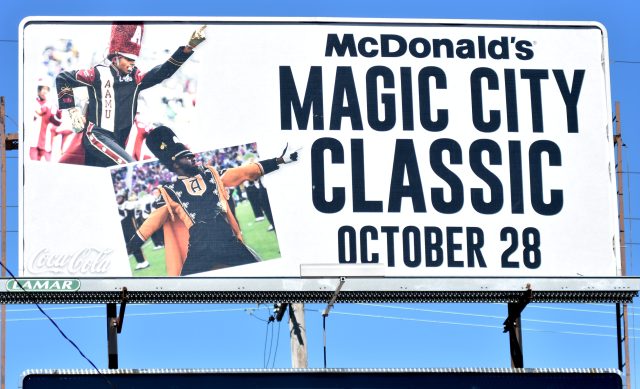
By Solomon Crenshaw Jr.
For The Birmingham Times
The band directors at the Magic City Classic know there are some fans that won’t enter Birmingham’s Legion Field until just before intermission and some that may leave before the second-half kickoff.
And they’re fine with that.
“To be honest with you, the band is, to me, the most important part of that game,” said James Oliver, Ed.D., director of bands at Alabama State University (ASU). “The band is what’s going to bring that entertainment to the people, and some people just come for the band.”
On Saturday, October 28, ASU and Alabama Agricultural and Mechanical University (AAMU) will meet on the gridiron at Legion Field for the Magic City Classic, the largest historically Black college and university (HBCU) football game in the nation.
Oliver believes that many female attendees may not understand football; they come for the band. Other attendees come for football—and the band, he said.
“The [seating] section next to the band—I hear this from the ticket office all the time—gets filled up quick, before any other section in the stadium,” Oliver said. “The band brings that excitement to the football game. It brings a lot of band heads and a lot of band students, especially little kids that want to see it.
“They’re not paying attention to football, but they’ll stop and look at the halftime show when it’s on that field. It is the highlight of every football game. Try not having the band there.”
Carlton J. Wright, director of the AAMU band, said HBCU band performances have gone to another level.
“It used to be that the field show was—and it still is—the primary reason why bands exist in the HBCU world,” he said. “But now there’s an element called the stand battles, or fifth quarters, when the bands go back and forth at the end of the game. Take the Magic City Classic. We at [AAMU] will play a tune, and after we finish [ASU] will play a tune.”
The postgame performances go back and forth for about three or four rounds, leaving fans to proclaim the winner.
“Our fans are gonna say we won. Their fans are gonna say they won,” Wright said. “Then you’re gonna have those people in the middle who have no ties to either university that might say, ‘OK, [AAMU] won this one or [ASU] won that one,’ but it’s all in entertainment.”
Sports attorney Donald M. Jackson has game programs from HBCU athletic events dating back decades. Years ago, the front covers of those programs featured football players.
Today, he says, a greater emphasis when promoting an HBCU football classic is placed on the bands. In fact, leading up to this year’s matchup, a billboard along northbound Interstate 65 in Birmingham promotes the Magic City Classic with images of the drum majors of the respective schools.
Jackson, an adjunct associate professor of sports law at Samford University, said such marketing is counterproductive in the age of name, image, and likeness (NIL) rights, which “refer to the ability of an individual to control and profit from the use of their name, image, and likeness in various forms of media, including advertising, merchandise, and video games.
These rights have historically been associated with professional athletes and celebrities, but now college athletes also are able to monetize their NIL rights,” according to the NIL Network.
“Ninety-eight out of 100 people who go to the Magic City Classic don’t care anything about football,” said Jackson, who earned an undergraduate degree from ASU before earning his law degree from the University of Virginia. “They’re focused on the ancillary things, and the ancillary things don’t necessarily benefit the athletic department.”
“The fans that come to the game to see a band are not going to contribute to an NIL collective,” the attorney added. “The fans that come to the game to see a band and leave [after] halftime are not going to donate any money to the athletic department or to a booster club. The fans that come to games to see a band are not going to donate any money to a school. They’re going to see the band, and then they’re going home after halftime.”
Jackson said marketing bands and dancing girls do little to reel in high-level football recruits.
“As a matter of fact, in some instances, it actually may drive them away,” he said. “If you’re a five-star quarterback, you want a university’s marketing during football season to focus on you, not on a band or drum major.”
The 82nd Magic City Classic between Alabama Agricultural and Mechanical University and Alabama State University will take place on Saturday, October 28, at Birmingham’s Legion Field. Kickoff is at 2:30 p.m. Central Time.




